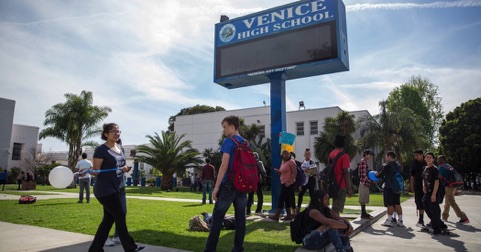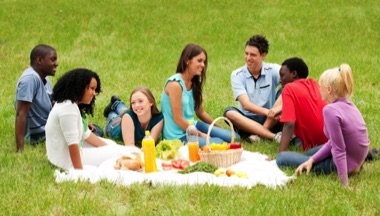Expressions
A Social Skills Program for Teens with High-Functioning Autism
“Expressions” is a therapeutic social skills training program focusing on self-discovery and friendship. ASD teens are paired up with mainstream peers in interactive activities designed to improve their ability to build and maintain friendships, as well as respond appropriately in a variety of social situations.
1. “Expressions” is not simply about memorizing scripts of proper behavior. It is designed to strengthen the mental muscles governing and generating those behaviors – empathy, the ability to focus on others, to learn via imitating, and understanding the cause-and-effect relationships between one's actions and others' behavior and feelings.
2. Sessions are substantial, yet fun – most kids have no idea that this is a social skills group! Our exercises draw a lot from acting, improvisation, cinema, and creative writing.
3. Our lesson plans focus specifically on the issues of the teenage life phase, such as adult identity formation, dating, cliques, career aspirations and a desire for independence.
4. Including NT peers of the same age range in the role plays allows ASD teens to practice and refine their social skills based on the reactions, behavior, facial expressions, pragmatic language, etc. of mainstream students as they would see in the real world – but in a safe environment, without the risk of encountering negative experiences. Since the peer volunteers are from the mainstream / magnet population of the same high school, there is more opportunity for them and ASD students to bond and socialize on campus outside of the sessions, as well.
How is “Expressions” different from other social skills groups?
Curriculum
The program's teaching method relies on a tried and true learning process: Starting from observation of the targeted skill, we proceed to assisted analysis (how is it done?), then to replicating in session, and finally to replicating in real life (as homework assignment). This methodology will also help ASD teens “learn how to learn” social skills. This meta-learning is an added benefit of the curriculum, since – as the old adage states – it is better to teach someone how to fish than to give them fish! During the sessions, facilitators provide individual assistance if a child needs help with a certain exercise.
Sessions are 90 minutes long. Each session consists of 60 minutes of structured exercises, followed by 30 minutes of parent support, homework discussion and unstructured social interaction. The program consists of 30 sequential sessions. The sessions can be broken down into 4 modules, which are the following:




5 . Emphasizing the idea of self-discovery and self-im provement for all participants -- ASD and mainstream alike – moves the child's frame of mind away from their diagnosis, and provides therapists with an opening to work on the self-esteem and identity concept of ASD children.
6 . The program inspires children to use their differences in abilities in order to help one another. For example, NT children are better at social skills, but there are areas in which an autistic student might be more talented or knowledgeable (like math, science, or dinosaur species) and can offer that skill to help others. This helps teens on the spectrum with their self-esteem, and to find emotional reward in friendships.
I. The exploration of self and others as unique individuals (“Introspection”)
This module is meant to lay the groundwork – emotionally and cognitively – to the skill building lessons by strengthening ASD children's ability to use "theory of mind" and to imitate others. It also aims to increase ASD children's motivation to participate meaningfully in the activities by raising their self-esteem, working on a positive, unique self-concept, and identifying the emotional rewards in social interactions and relationships.
II. Non-verbal communication and its relationship to our emotions. (“How to say”)
The three major topics addressed in this module are: voice (pitch, volume, intonation); body language; and facial expressions (including eye contact). With the use of verbal and non-verbal exercises that get progressively more sophisticated – solo tasks, interactive activities, guided role-play, and freestyle role-play – ASD children will learn how to identify the emotions and intent of others based on non-verbal communication, and how to use non-verbal communication appropriately in order to get their messages across.
III. Effective, reciprocal communication. (“What to say”)
In this module, we use role play to guide ASD teens on topics such as how to introduce oneself; how to join, start and end a conversation; the importance of staying on topic; how to change topic; how to give and receive compliments, or express disagreement; how context can define, or cause variations to, the meaning of verbal communication; how to identify jokes, humor and irony, and how to respond to them.
IV. Using the tools learned for building and maintaining friendships. (“Problem Solving”)
The last module gives ASD children an opportunity to practice problem-solving in interpersonal relationships using the tools they acquired in the previous sessions, and also prepares them to successfully handle unpleasant social situations such as teasing, bullying, and negative peer pressure.
At the conclusion of each session, participants are given “homework assignments,” which are intended to help ASD children generalize the knowledge they learnt during that meeting. These are usually not written tasks, but activities or conscious observations they need to do. Parents are strongly encouraged to assist their children in completing these exercises. If the child has a school counselor, speech therapist, or one-on-one aide at the school, we also like to involve these professionals in the process. With the written consent of the parents, we communicate with relevant school staff about the homework assignment and any other issues that need to be worked on between sessions.

Generalization, Community Integration
Complementing the 30 sessions, we also have monthly “field trips” – activities and get-togethers in the community. In addition to helping ASD teens improve social skills, another important goal of Expressions is to facilitate forging friendships with others, and to link families to free or low-cost natural socializing venues in the community, so that when they are discharged from the program, children can continue to develop their social skills by relying on an improved social support system.
